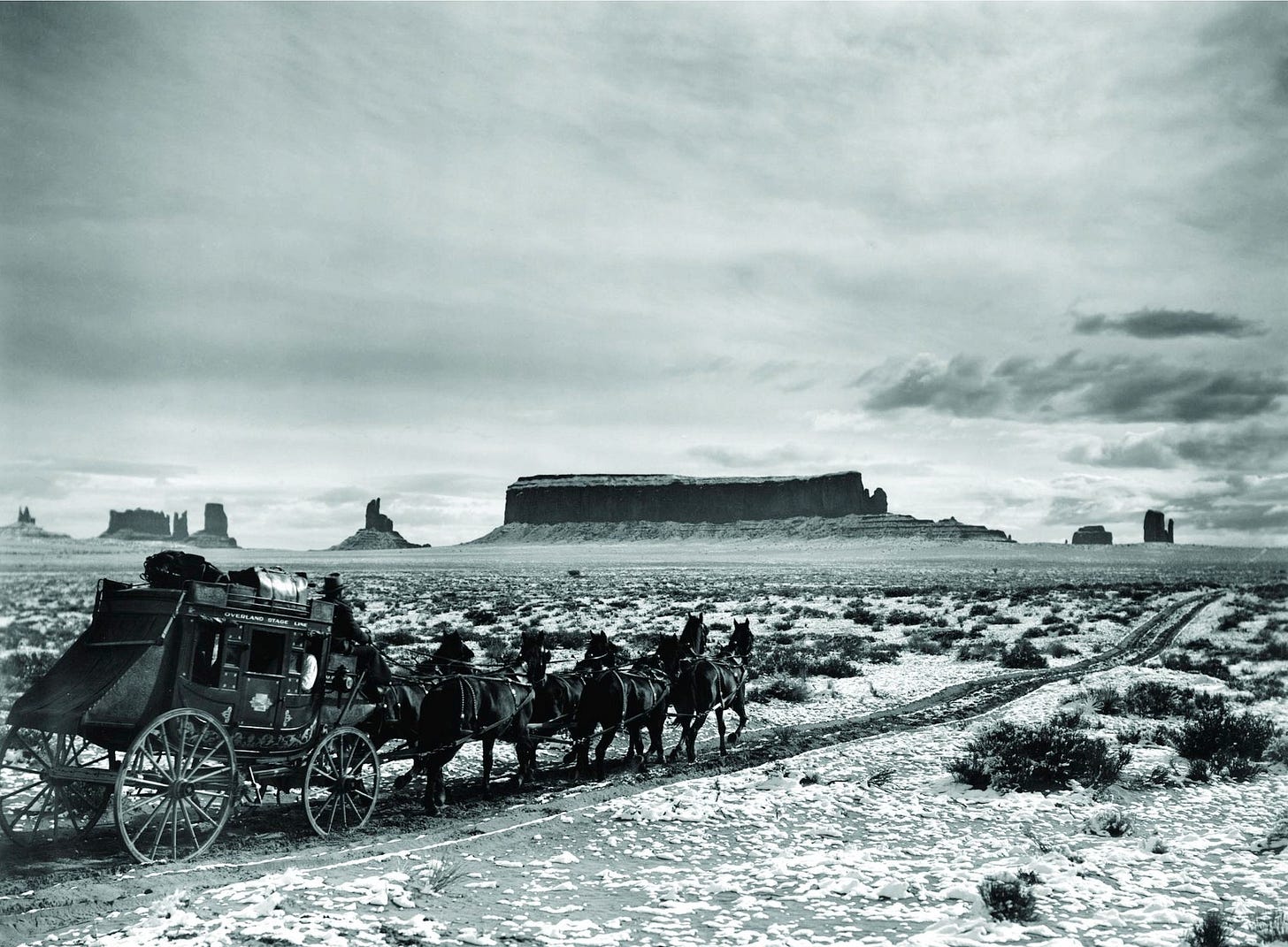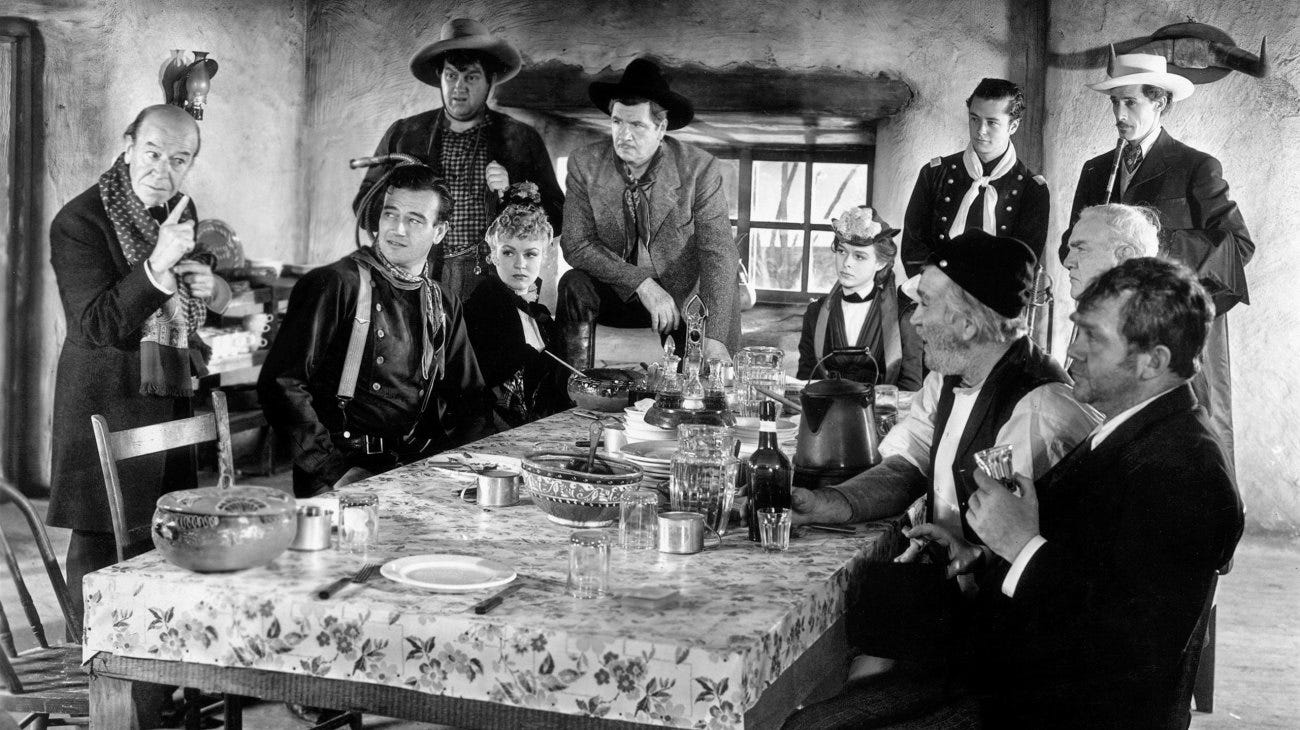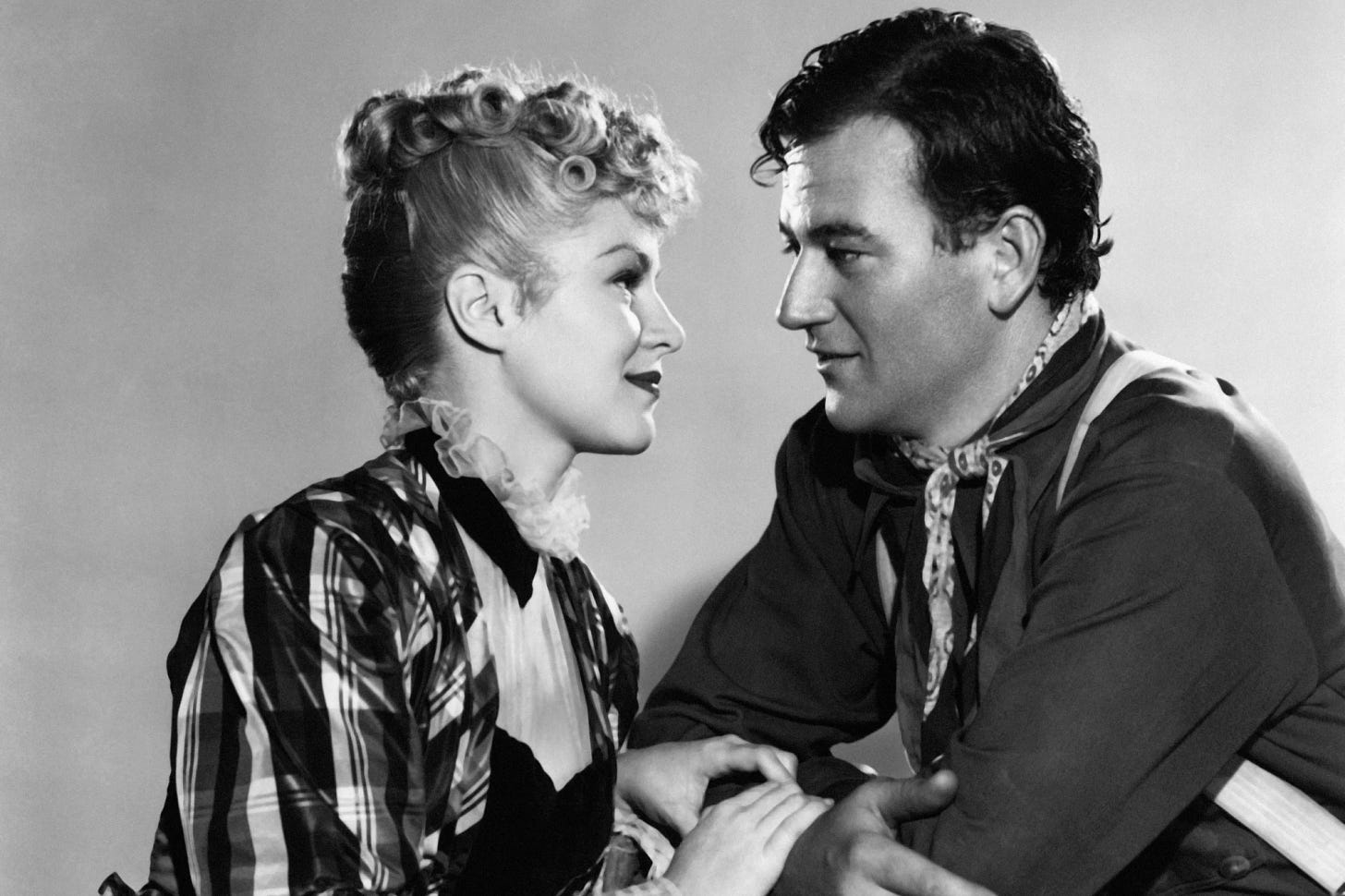100 Movies Every Catholic Should See #75: Stagecoach (1939)
Directed by John Ford. Starring Claire Trevor and John Wayne.
We are all together on the same boat on a stormy sea, and we owe each other a terrible loyalty - G.K. Chesterton
Sociologist Robert Putnam identified in Bowling Alone and other studies, the enormous loss of community connection that has taken place over decades in our society. Movies from Hollywood’s Golden Age carry a mysterious aesthetic and moral power to rebuild this lost social capital and unity.
Recently at the Educational Guidance Institute (EGI) we finalized our new curriculum, Teaching and Learning Civic Engagement through the Art of Classic Film. There, our Unit 2 features the theme of care and defense of the Common Good with classic westerns like High Noon and The Man Who Shot Liberty Valence. Yet it was just within the past several weeks when Sam Morales, Cameron DeLaFleur and I got together for a podcast and Sam asked me to write a piece on Stagecoach that I realized:
John Ford’s 1939 masterpiece is one of the best vehicles for middle schoolers, high schoolers, college students and young adults to ponder the question: WHAT MAKES A GOOD CITIZEN?
The characters in Stagecoach teach us timeless lessons about human nature itself. From the beginning scenes we learn human beings do in fact share a common human nature. This was the big idea that started to get lost centuries ago in the long history of political theory. Which tradition of thought about human nature is true: the nominalism of William of Ockham and rationalistic dualism of Descartes or the classic tradition of Aristotle, Cicero and Thomas Aquinas carried on by 20th century philosophers such as Jacques Maritain, Josef Pieper, Mortimer Adler, Alisdair MacIntyre and Heinrich Rommen?
At Georgetown University in the early 1960s, I had the blessing to study political theory and the natural law under Rommen (who had escaped from the Gestapo to come to the US in the late 1930s). The disputes today among contemporary political theorists on both Left and Right revolve around such questions as whether our Founding Fathers were in the long run walking the “Aristotelian Road” or whether they were largely stuck in the varying “State of Nature” theories of the Enlightenment. From my experience with both high school and college students over these many years, it seems clear that small but important steps towards rebuilding community in our fragmented culture can be generated studying the human condition in classic movie storytelling. All of the films we include in our Civic Engagement curriculum, but in particular Stagecoach, give us a grounding in classical philosophical anthropology. I would argue, along with my great teacher Rommen, that the Founders built the spirit of the Constitution in this same classical tradition.
In the first scenes we see Thomas Mitchell as Doc Boone and Claire Trevor as Dallas being run out of town by a group of women identified in the script as the “Law and Order League”. This group has decided that Doc and Dallas do not belong in the community - Doc because he is an alcoholic and Dallas because she is a prostitute. Director John Ford shows us the truth - all of us share a fallen human condition. It is this idea of the natural law that was present in the greatest of the films of classic Hollywood from 1934 to the late 1950s and early 1960s, when the Motion Picture Production Code was operational within the Hollywood studios. An account of the role of the Code in its cultural context is given in EGI’s documentary The Art of Classic Film.
Stagecoach is one of the best examples of how the Code standards worked out practically under the care of a great director and a skilled screenwriter. The best corollary is to compare this film as the defining Western and Double Indemnity as the defining film noir. In these two five-star films the moral issues are seen as non-negotiable and no voices from the far right or far left can be noticed on social media feeling offended by anything in these films. We may be practically in the middle of a political civil war, but it can be confidently said that on either side of this war there can be found classic movie fans who love these films. When we see the characters acting out life in Stagecoach and Double Indemnity, we are witnessing the connaturality that leads to our poetic knowledge of what is true, good and beautiful; this is the power of this visual art form.
Seeing the stagecoach travel through Monument Valley we can’t help but see ourselves as passengers right alongside Doc Boone, Dallas and the Ringo Kid (John Wayne in his breakthrough role). It is Doc Boone who holds the story together: he is there at the beginning to escort and comfort Dallas in their forced exit from the safety of the town. In the first vote of this traveling political community, it is the two women who sway the outcome for moving ahead with courage. In the second vote, the script calls for Doc to vote by saying in effect, it’s ok with me either way, as long as I can get my next drink - yet the rest of the passengers know he is voting to go on. And his credibility has grown much higher as all of the other “voters” traveling with him know: when it was all up to him, he drinks the coffee and comes through for Mrs. Mallory and her child.
We are in a cultural era when so much of our lives together is more utilitarian and transactional than communal. Yet, God in His Providence has made us social beings to not only know Him but come to know and be dependent on each other in our social natures. The renowned Notre Dame philosopher Alasdair MacIntyre wrote a series of books guiding his readers to conduct classic moral inquiry on this question: Who are we? His book answering that question carries the title Dependent Rational Animals: Why Human Beings Need the Virtues. Consider the relationship that unfolds between Dallas and Mrs. Mallory. We see clearly in these two women that it is character and living the virtues that counts over class, social status or the external circumstances of life. Observing the character of Claire Trevor’s Dallas, we can all see she is where she is in life more through harsh circumstances than deliberate moral choice. In the Aristotelian mode of classic moral inquiry, Dallas carries the natural virtue of magnanimity. She has a large heart with room to deal with insults and her first moral instinct is to be magnanimous to others.
The Personal and the Public Blend together in the Communal Life: Tribalism cannot be avoided in our Fallen World
Ringo and Dallas sit down at the table for a communal meal, but John Carradine’s southern gambler is bent on showing off with Mrs. Mallory and she succumbs to the vice of snobbery, moving with him to the foot of the table. Yet this tribalist exclusiveness gives Dallas and Ringo a chance to get to know one another with some privacy. In the final battle are some moral life lessons: this same gambler gives his life for the sake of the common good even though he is seen as self-serving up to this fatal time. Donald Meek’s liquor salesman is another character who makes the choice for community over tribalism. One character on the stagecoach, the banker who has stolen money and whose wife is head of the “Law and Order League” is the one character depicted in a definitive dual persona. The threads of family, community and civil life intermingle naturally in the relationship between Ringo and the Sheriff.
Dallas and the Ringo Kid: The Mysterious Puzzle of a Man and Woman Falling in Love
Often in classic films, enduring love between a man and a woman is portrayed in terms of discovery. In contrast, especially in the films that marked the years after the Code was abolished, romantic love is seen not so much as discovery and finding each other but rather in the mode of two autonomous selves engaged in a transaction. Sadly, it seemed to be harder and harder from the late 60s on for Hollywood to give us a heartwarming romantic love story that did not offend or discourage a fair number of viewers. Yet being committed fans of classic movies, we might find ourselves just putting up with a mediocre film because of the presence of dearly beloved stars of the golden era still performing in the leads.
Claire Trevor’s Dallas and John Wayne’s Ringo Kid work together to transport themselves out of the sociological boxes they find themselves in. In the classic mode of inquiry, we know they carry with them the weight of poor moral choices, but they also have been impacted by life circumstances beyond their control. The script allows room for Dallas and Ringo to realize that they can make a life together. This is an elevating model for today’s generation - an example of commitment in a time of shredded social and moral norms. Walking the Aristotelian Road with classic storytelling, today’s young people can become, in St. John Paul II’s phrase, “acting personas” and shred as toxic untruths the idea that worldly success and personal fulfillment are the best goals to pursue in life.
In the end, two people can find each other aided by conversations about the meaning of life. Ringo tells Dallas, I have a ranch over the border, a man and a woman could make a life together there. In this study in classic philosophical anthropology, Trevor’s character tries to avoid the uncomfortable confrontation that is likely and does take place in the town of their destination: she urges Ringo to escape when the audience knows that the highest and best virtuous action is to stick it out on the ride to the town and confront their love for each other and their future there.
I love Stagecoach for its delicate and balancing depictions of the big picture view of life, the civic virtues that are necessary in a free society, and the genuine commitment of unconditional love between a man and a woman.
Check out further doings of Educational Guidance Institute’s Classic Film Study Project here and feel free to direct inquiries to Onalee McGraw at EGIatthemovies@gmail.com.









Outstanding film, watched it recently with my dad. John Ford, a master of the art of film. I have seen My Darling Clementine many times!